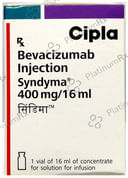Bevacizumab
Uses
Bevacizumab is used in the treatment of colon and rectal cancer, ovarian cancer, cervical cancer, kidney cancer, brain tumors, and non-small cell lung cancer.
How it Works
How Bevacizumab Works Bevacizumab is an anti-angiogenic medication. It works by blocking a protein called vascular endothelial growth factor (VEGF). This action inhibits the formation of blood vessels that supply oxygen and nutrients to cancerous cells.
Side Effects
Common side effects of Bevacizumab include exfoliative dermatitis, high blood pressure, nosebleeds, protein in urine, decreased appetite, electrolyte imbalance, peripheral sensory neuropathy, breathlessness, thromboembolism, wound healing complications, ovarian failure, decreased white blood cell count (lymphocytes), low blood platelets, mucosal inflammation, abscess, cellulitis, hypersensitivity, and rectovaginal fistula.
Expert Advice
- Bevacizumab is an effective first-line treatment option when used in combination with other medications for certain types of cancers, including:
- Colorectal cancer
- Lung cancer
- Cervical cancer
- Kidney cancer
- Bevacizumab is administered as an infusion.
- Your doctor or nurse will monitor you for signs of an infusion reaction, which may include:
- High blood pressure
- Trouble breathing
- Bevacizumab can impair your wound healing ability.
- Inform your doctor that you are taking this medication before undergoing any surgical procedures.
- This medication may increase the risk of bleeding.
- Notify your doctor if you experience any unusual bleeding or bleeding that does not stop easily.
- Your doctor may regularly check your blood pressure and protein levels in your urine while you are on Bevacizumab.
Related Medications
Bevacizumab 400mg

₹52,500

₹24,306.8
MRP ₹40,511.3
Bevacizumab 400mg

₹53,888

₹24,306.8
MRP ₹40,511.3
Bevacizumab 400mg

₹52,500

₹24,306.8
MRP ₹40,511.3
Bevacizumab 400mg

₹43,859

₹33,518.7
MRP ₹51,567.2
Bevacizumab 400mg

₹39,000

₹24,306.8
MRP ₹40,511.3
Bevacizumab 400mg

₹123,506

₹24,306.8
MRP ₹40,511.3
Bevacizumab 400mg

₹99,360

₹24,306.8
MRP ₹40,511.3
Bevacizumab 400mg

₹43,369.4

₹24,306.8
MRP ₹40,511.3
Bevacizumab 400mg

₹48,990

₹24,306.8
MRP ₹40,511.3
Bevacizumab 400mg

₹39,000

₹24,306.8
MRP ₹40,511.3
Bevacizumab 400mg

₹35,120

₹24,306.8
MRP ₹40,511.3
Bevacizumab 400mg

₹37,998

₹24,306.8
MRP ₹40,511.3
Bevacizumab 400mg

₹30,000

₹24,306.8
MRP ₹40,511.3
Bevacizumab 100mg

₹12,935
MRP ₹19,900
Bevacizumab 100mg

₹18,000

₹12,935
MRP ₹19,900
Bevacizumab 100mg

₹13,451

₹12,935
MRP ₹19,900
Bevacizumab 300mg

₹27,990

₹11,643.8
MRP ₹16,875
Bevacizumab 100mg

₹6,093.8
MRP ₹12,187.5
Bevacizumab 100mg

₹11,336

₹6,093.8
MRP ₹12,187.5
Bevacizumab 100mg

₹32,250

₹12,935
MRP ₹19,900
Bevacizumab 100mg

₹18,200

₹12,935
MRP ₹19,900
Bevacizumab 100mg

₹20,011

₹12,935
MRP ₹19,900
Bevacizumab 100mg

₹17,990

₹12,935
MRP ₹19,900
Bevacizumab 100mg

₹10,000

₹12,935
MRP ₹19,900
Bevacizumab 25mg

MRP ₹117,625
Flat ₹100 off on first app order | Use Code: APP100 |
Flat ₹100 off on first app order
USE CODE: APP100

Download Now